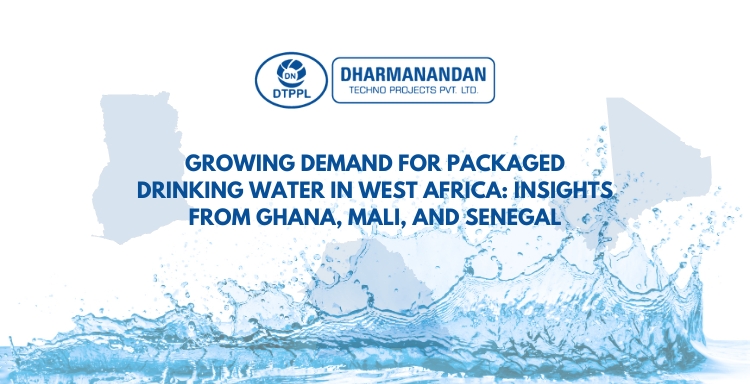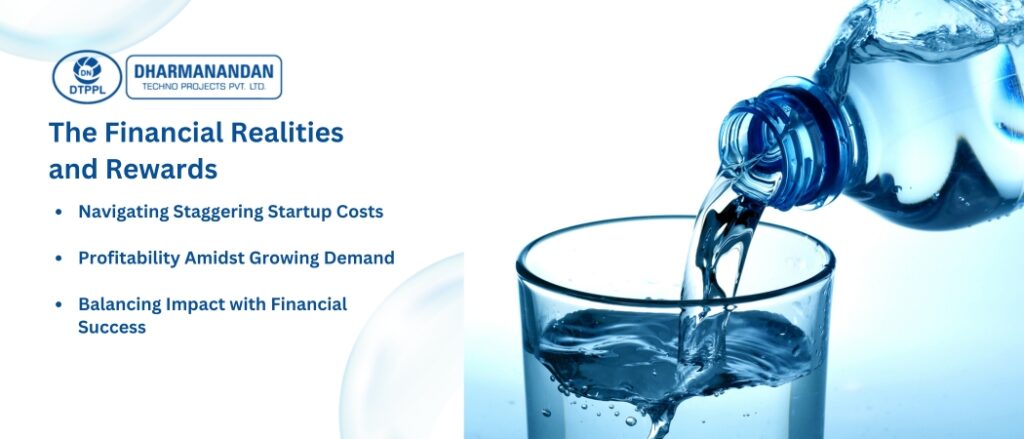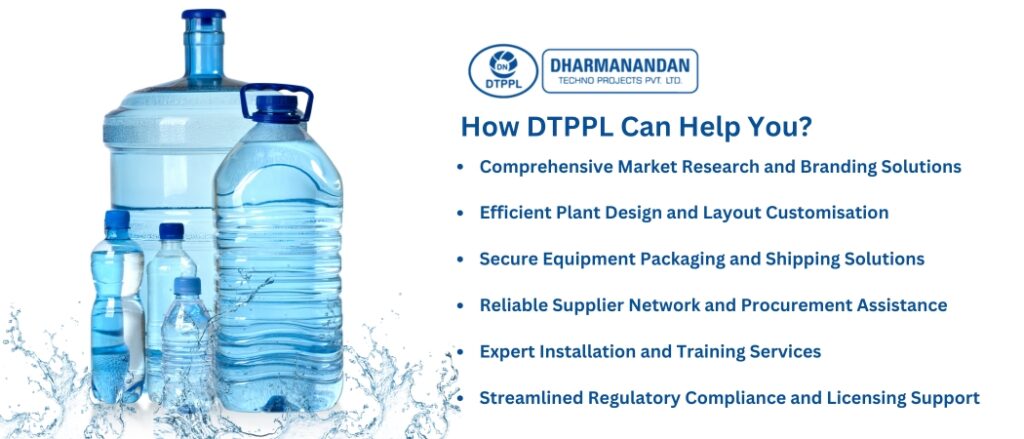
Table of Contents
Growing Demand for Packaged Drinking Water in West Africa: Insights from Ghana, Mali, and Senegal
December 28, 2024
The story begins with a dusty wind sweeping across the streets of Accra, Ghana. The heat is merciless, clinging to every breath, every step. A mother watches her child, beads of sweat glistening on her forehead, as she carries a heavy bucket of water up a hill to their small home. It’s a daily routine etched into the memories of countless families across West Africa, from bustling cities in Ghana to the sun-scorched plains of Mali and the bustling fishing towns of Senegal.
Water—something so essential yet so scarce and unreliable. But here’s where the story takes a hopeful turn. Packaged drinking water, once a luxury reserved for the wealthy, is becoming an accessible necessity, thanks to the emergence of mineral water plants. This demand is more than just a business opportunity; it’s a chance to change lives.
The Pain of Water Scarcity
Imagine living in Bamako, the capital of Mali, where rivers have turned into dry beds and water pipes sit idle for days, sometimes weeks. Families feel the crushing stress of wondering whether their children will have clean water to drink. The helplessness of watching crops wither and not being able to provide for loved ones is ever-present. It’s not just an inconvenience; it’s a relentless ache, a shadow that follows every moment.
In Ghana, the story is no different. Waterborne diseases claim lives every day, and for many, the fear of cholera or dysentery is always looming. In Senegal, people who once depended on clean ocean waters now worry about contamination affecting their health. The pain of water scarcity isn’t just physical—it digs deep, leaving emotional scars.
Rising Demand for Packaged Water: A Beacon of Hope
Despite the suffering, a wave of change is sweeping through West Africa. The demand for packaged drinking water is rising rapidly, offering a glimmer of hope. In Accra, where mothers once trudged miles for water, bottled water vendors now line the streets, making clean, reliable hydration more accessible.
The emergence of mineral water plants in Ghana has sparked this change. Entrepreneurs have invested their savings, knowing that the need for clean water is not just a market—it’s a matter of survival. The bustling city of Dakar in Senegal echoes the same story. Here, mineral water plants work tirelessly to meet the ever-growing demand, transforming lives one bottle at a time.
Research & Brand Developing
As the packaged water market grows, entrepreneurs are realizing that it’s not just about producing water – it’s about creating a brand that resonates with consumers.
Gaining insights into consumer preferences and the competitive landscape is critical to success. Understanding the bottle market, studying packaging trends, and identifying what drives consumer choices can make or break a venture. By leveraging expert guidance on bottle design, labels, and logo creation, entrepreneurs can craft a winning brand strategy that captures attention and builds trust.
Packaging plays a crucial role in the packaged water industry. Eye-catching bottle designs and vibrant labels don’t just stand out on store shelves; they also communicate quality, reliability, and safety to consumers. A well-developed brand helps businesses establish themselves as market leaders and build customer loyalty in an increasingly crowded space.
The Emotional Struggle of Entrepreneurs
Starting a mineral water plant business in West Africa is not for the faint of heart. Imagine the emotional turmoil of spending sleepless nights worrying about the cost of setting up a mineral water plant. It’s a constant balancing act: investing in high-quality mineral water machines while ensuring there are enough funds to pay workers. The fear of failure looms over every decision, but those driven by the desire to make a difference press on.
In Mali, entrepreneurs face equally daunting challenges. Securing land for a plant is a bureaucratic nightmare tangled in endless red tape and inflated costs. The mineral water plant setup cost can make even the most optimistic dreamers pause. But those who push forward find that the rewards go beyond financial gains. When the first truckload of bottled water rolls out of a plant, it’s not just a business success; it’s a lifeline for the community.

The Role of Mineral Water Plants in Ghana
Ghana is a trailblazer in the West African packaged water revolution. With the growing demand, more mineral water plants are springing up in both urban and rural areas. But the journey is fraught with challenges. Entrepreneurs must source reliable mineral water equipment, which often means dealing with expensive imports. The mineral water machine price can crush dreams, but many business owners have found innovative ways to make it work, from leasing equipment to forming cooperative partnerships.
One plant owner in Ghana described the joy of watching the transformation of a village. Once, water scarcity was a daily nightmare; now, families purchase affordable bottled water without a second thought. The mineral water plant project isn’t just a venture-it’s a mission to improve health, where children no longer miss school due to waterborne illnesses, and their laughter fills the air like a symphony of hope.
Senegal: A Country Embracing Change
In Senegal, the story of packaged drinking water is equally inspiring. The rise of the mineral water plant in Senegal has created a ripple effect, improving not only health but also economic opportunities. Young people who once struggled to find work are now employed in these plants, learning valuable skills and supporting their families. The sense of pride and dignity this brings is immeasurable.
But setting up a plant in Senegal isn’t without stress. The cost of mineral water plant machinery is a massive hurdle. Entrepreneurs worry not just about purchasing equipment but also about the maintenance and reliability of these machines. One plant owner recounted a harrowing experience when the machinery broke down during a critical production run. The stress was suffocating, but with determination and teamwork, the crisis was overcome, and today, the plant supplies water to thousands of homes.
Mali: Overcoming Obstacles and Finding Success
Mali, with its harsh landscape and limited resources, poses perhaps the greatest challenge. Yet, there’s a beauty in how communities unite to overcome obstacles. The mineral water plant in Mali is more than just a business initiative; it’s a story of resilience and solidarity. Women who once spent entire days fetching water now have more time to care for their children and pursue education.
A former farmer turned to the water business after years of droughts ruined his crops. The 20 ltr jar mineral water plant cost nearly crushed his dream, but through perseverance and community support, he made it work. Today, the plant stands as a beacon of hope, a symbol of what’s possible when people come together.
The Financial Realities and Rewards
Talking about the mineral water business cost brings up mixed emotions for entrepreneurs. The expenses are staggering: from land acquisition and machinery to licensing and marketing. For many, the journey starts with loans and sleepless nights, worrying about debt and uncertain profits. But as demand for packaged drinking water grows, so does the potential for financial reward. In Ghana, successful plant owners report seeing their profits double in a matter of months, proving that the mineral water business can be both impactful and profitable.
Yet, the journey isn’t just about money. It’s about the feeling of knowing that every bottle of water sold could prevent a child from falling ill. It’s about transforming fear and anxiety into fulfillment and success.

Technology and Innovation: The Way Forward
The future of the mineral water plant business in West Africa lies in innovation. Companies are experimenting with eco-friendly packaging and solar-powered purification systems to reduce costs and environmental impact. In Senegal, a tech-savvy team of entrepreneurs is using mobile apps to streamline delivery services, making clean water more accessible to remote areas.
The mineral water plants of tomorrow will need to be smarter, more efficient, and sustainable. But if the stories of today’s entrepreneurs are any indication, the region is well on its way to achieving this.
The Impact on Communities and Future Generations
The ripple effects of the growing packaged water industry are profound. In Ghana, children who once missed school to fetch water now dream of bright futures, thanks to improved health and access to clean water. In Mali, women who once bore the brunt of water collection duties are finding new opportunities for education and entrepreneurship. In Senegal, stable employment at mineral water plants is transforming family dynamics and providing hope for the next generation.
These stories paint a picture of hope, proving that addressing the demand for clean water is not just about business—it’s about changing lives, empowering communities, and creating a brighter future for West Africa.
How DTPPL Can Help You?
1. Market Research & Brand Development
- Challenge: Entrepreneurs often lack expertise in conducting detailed market research, understanding consumer preferences, and creating impactful branding.
- Solution by DTPPL:
- Provides actionable insights into the bottle market, competitive landscape, and packaging trends.
- Offers expert guidance on bottle design, labels, and logos to develop a compelling brand identity.
- Ensures businesses stand out with innovative and visually appealing packaging.
2. Plant Design & Layout
- Challenge: Inefficient use of space and non-compliance with regulations can hinder productivity.
- Solution by DTPPL:
- Customizes plant layouts for maximum efficiency, utilizing space effectively.
- Separates machine areas, labs, and storage zones while ensuring compliance with regulatory standards.
- Provides electrification specifications and optimizes entry/exit placements for smooth workflows.
3. Equipment Packaging, Handling, and Shipping
- Challenge: Machinery is vulnerable to damage during international transit, causing delays and financial losses.
- Solution by DTPPL:
- Offers specialized packaging and secure handling for equipment.
- Ensures compliance with international shipping regulations for smooth customs clearance.
- Tracks shipments to guarantee safe and timely delivery.
4. Supplier Network & Procurement
- Challenge: Finding reliable suppliers for essential materials like caps, labels, and preforms can be difficult.
- Solution by DTPPL:
- Connects clients to a trusted network of suppliers for high-quality raw materials at competitive prices.
- Streamlines procurement processes to ensure timely delivery of essentials.
5. Installation & Training
- Challenge: Entrepreneurs may lack technical expertise in plant setup, operation, and maintenance.
- Solution by DTPPL:
- Provides skilled technicians for plant installation and commissioning.
- Offers hands-on training in machine operation, preventive maintenance, and troubleshooting.
- Equips teams with the knowledge to reduce downtime and improve productivity.
6. Regulatory Compliance and Licensing
- Challenge: Navigating complex regulatory frameworks and licensing processes can be overwhelming.
- Solution by DTPPL:
- Assists in preparing and submitting documentation for licensing and ensures compliance with local and international standards.
- Keeps businesses updated on regulatory changes to ensure uninterrupted operations.


Conclusion
The growing demand for packaged drinking water in West Africa is more than a market trend; it’s a human story of pain, perseverance, and transformation. From the bustling streets of Accra to the arid lands of Mali and the vibrant coasts of Senegal, mineral water plants are reshaping lives, one bottle at a time. It’s a journey filled with obstacles but marked by incredible resilience and heartwarming successes. As more people invest in this industry, they bring with them the promise of health, happiness, and a better tomorrow.
If you’re inspired to make a difference in this growing industry, partnering with a trusted supplier can be your first step. Dharmanandan Techno Projects Private Limited (DTPPL) is a renowned mineral water plants manufacturer and supplier, providing reliable equipment and expert guidance to help turn your vision into reality. Contact DTPPL today to start your journey in transforming lives through clean water.
